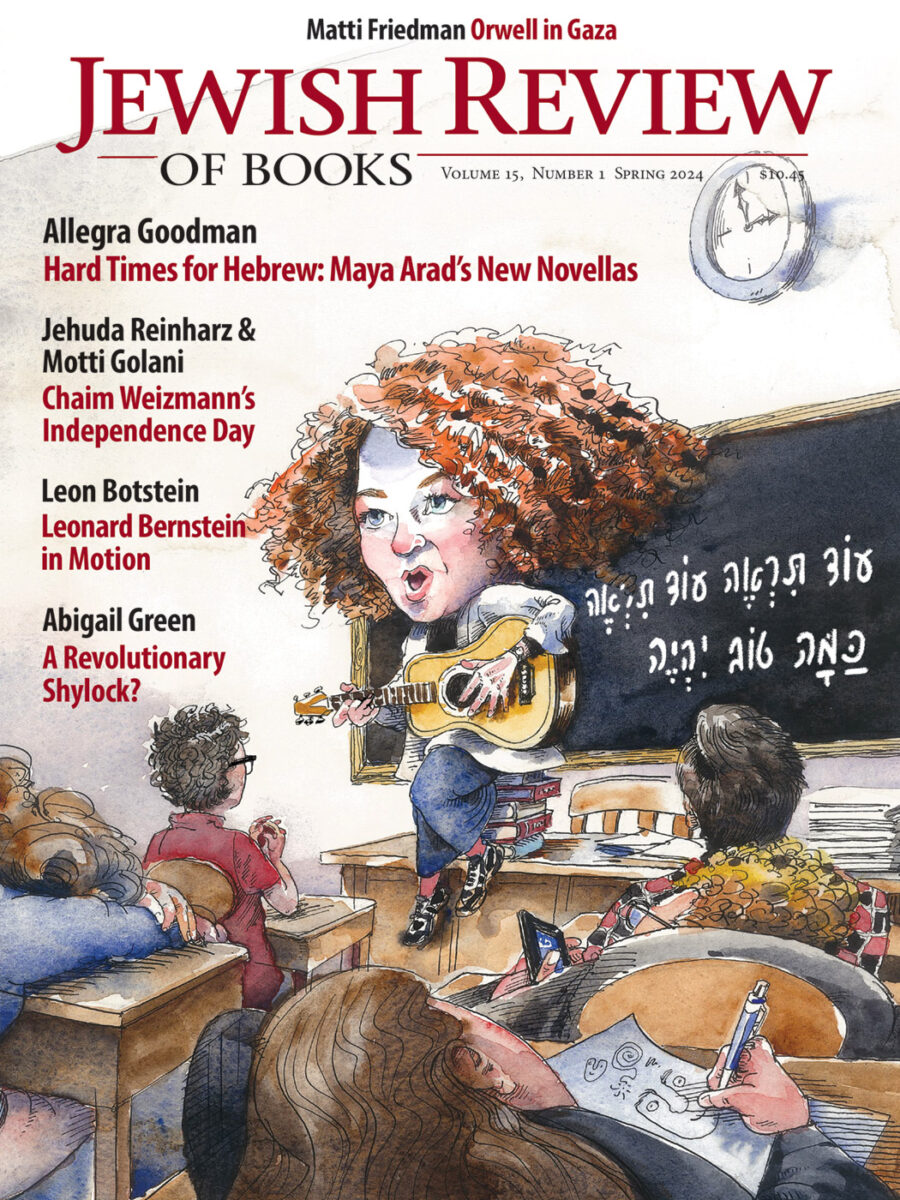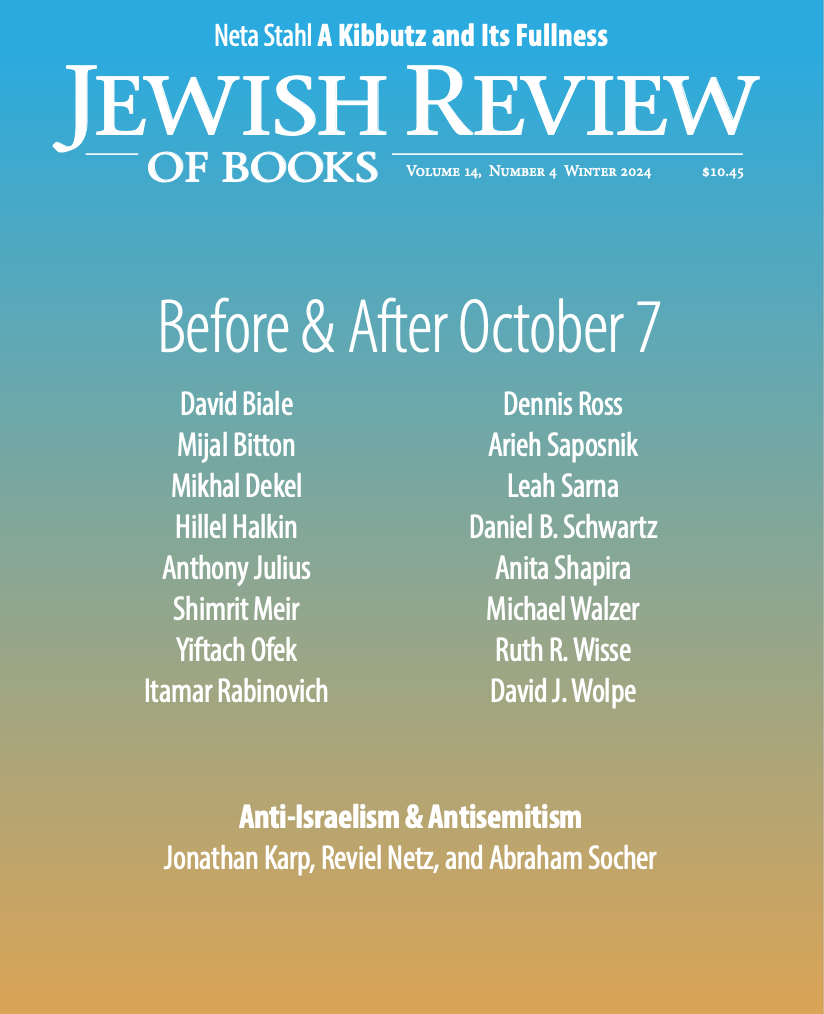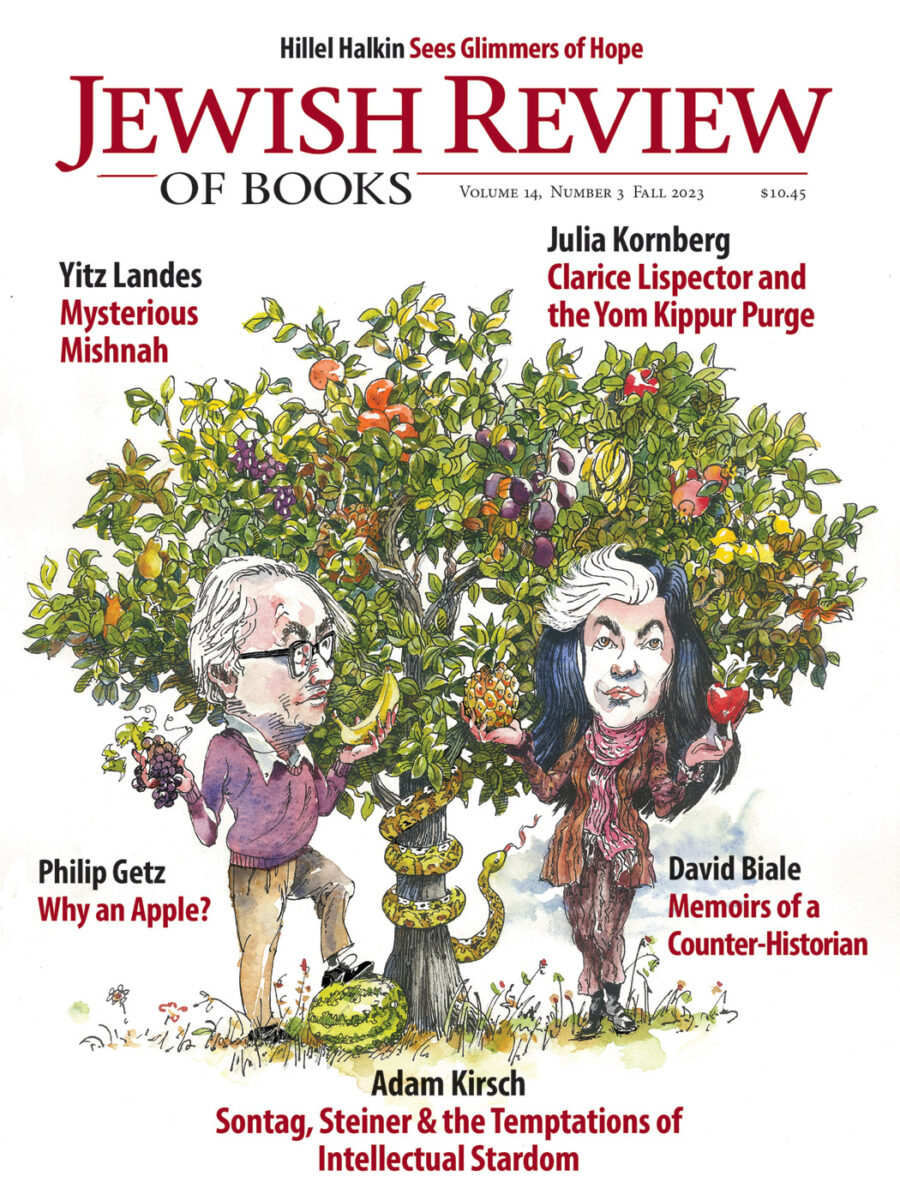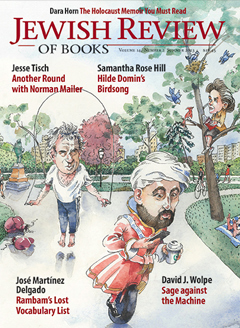Letters
Letters, Winter 2018
Rome and Jerusalem (and Cardinal Newman), Singer and Rabbi Dessler (and an fMRI Study), Levinas and Lear, and More
Features
A Complex Network of Pipes
You couldn’t know Yehuda Amichai without being struck by the casual way in which original and sometimes startling metaphors dropped from him in ordinary conversation. It wasn’t done for effect. It was just the way his mind worked. One thing made him think of another and what it made him think of was generally something that would not have occurred to anyone else.
100 Years of Solicitude: Commemorating Balfour
The controversies over how (and whether) Great Britain should celebrate the recent centenary of the Balfour Declaration were revealing. Anglo-Israel relations have rarely been uncomplicated, but they could soon be much worse.
Reviews
Black Fire on White Fire
The scroll, which was originally a secular technology, became closely associated with Judaism at a time when Christians were adopting the codex for their holy books.
In Praise of Humility
There are those who carry the quest for yichus to extremes; Steven Weitzman is not among them.
Rachel and Her Children
Eternal Life is Dara Horn’s fifth novel, and like her others it crosses time and place to tell a transfixing, multilayered story that draws on Jewish texts and themes in a deep, witty, and immensely readable fashion.
The Family Heretic
Mark Mazower’s What You Did Not Tell: A Russian Past and the Journey Home belongs to a newish genre: the Jewish family memoir that is an act of filiopiety but also illuminates broad historical themes.
Ritchie’s Boys and the Men from Zion
Our appreciation for stories of Jewish bravery during World War II sometimes obscures the fact that as a group Jews were powerless, reduced to begging others for a chance to bear arms.
The Many Dybbuks of Romain Gary
Romain Gary—a Lithuanian Jew who regarded himself a Frenchman par excellence—emerges in a recent memoir as a master of self-invention and (just as immoderate) verbal invention, a chameleon of pseudonyms, a man of irreconcilable contradictions, divided against himself.
Succession, Secession!
The notion of zera kodesh, “holy seed,” appears only twice in the Bible, both times in reference to the people of Israel as a whole. For Hasidim, however, it has a more restricted meaning.
History of a Passé Future
At their inception, the children’s house and collective education were to shape a new kind of emotionally healthy person unfettered by the crippling bonds of the traditional or bourgeois Jewish family. Over the last two decades or so, a cultural backlash has set in among some of those raised in children’s houses.
Life on a Hilltop
City on a Hilltop is superbly researched, altogether accessible, and will dispel many lazy stereotypes about the people whose story it tells. But it leaves out a lot.
The Last Bedtime Story: Roz Chast’s Sort-of Tour Guide
Realizing that her daughter knows nothing of the urban wilderness her mother once inhabited, Roz Chast takes it upon herself to bequeath her accumulated wisdom in the method most natural to her, a comic book.
A Tale of Two Stories
In their respective new books, Schama and Feiner attempt not to relate the whole history of the Jews during the period covered by their volumes but to tell their story—indeed, to a large extent, to let them tell their story in their own words, culled from their letters, diaries, and autobiographical works.
Readings
Joseph Roth: Grieving for a Lost Empire
Always in flight, one of the world’s permanent transients, Joseph Roth (1894–1939) was a one-man diaspora. A drunk and a fantasist, he was also a marvelous writer whose work was bedizened with metaphor, laced with simile.
The Arts
The Ruined House (An Excerpt)
In 2014 Ruby Namdar won the prestigious Sapir Prize for his novel Ha-bayit asher necherav, the first time in the award’s history that it went to a writer not living in Israel. On November 7, 2017, Harper released it under the title The Ruined House: A Novel, in an English translation by Hillel Halkin. The Jewish Review of Books is pleased to present this excerpt from the novel’s opening.
Ink and Blood
Arthur Szyk may well be the only great Jewish artist whose work countless people recognize simply because they have attended a Passover Seder. Less well known are the explicit connections between the Egyptian pharaoh and Hitler that Szyk had embedded in his original version of the haggadah he created in the 1930s.
Exchange
The Modern Crisis of Moral Thought: An Exchange
Andrew N. Koss, Abraham Socher
Abraham Socher's pre-Yom Kippur assessment of the possibility of true repentance led to a discussion on the mussarist's answer (or non-answer) on moral choices.
“The Point of Free Will”: A Response to Abraham Socher
For mussarists, the internal struggle between good and evil is the great cosmic and spiritual drama, a position entirely in line with the conventional rabbinic view of moral decision-making.
Always Messy: A Rejoinder to Andrew N. Koss
It may be useful as a tool for moral self-improvement to see oneself as adjudicating between opposing forces within one’s breast or brain, though where precisely the adjudicator, or charioteer, resides is more than a moot point.
Last Word
Babel’s Transcendent Mistakes
When I was 12, my parents bought me a gigantic Yiddish-Russian dictionary. Maybe this was their way of compensating for the fact that they had not told me I was Jewish until second grade, when I came home singing a Ukrainian ditty with the word “zhid.”
Past Issues

Issue No. 57
Spring 2024

Issue No. 56
Winter 2024

Issue No. 55
Fall 2023

Issue No. 54